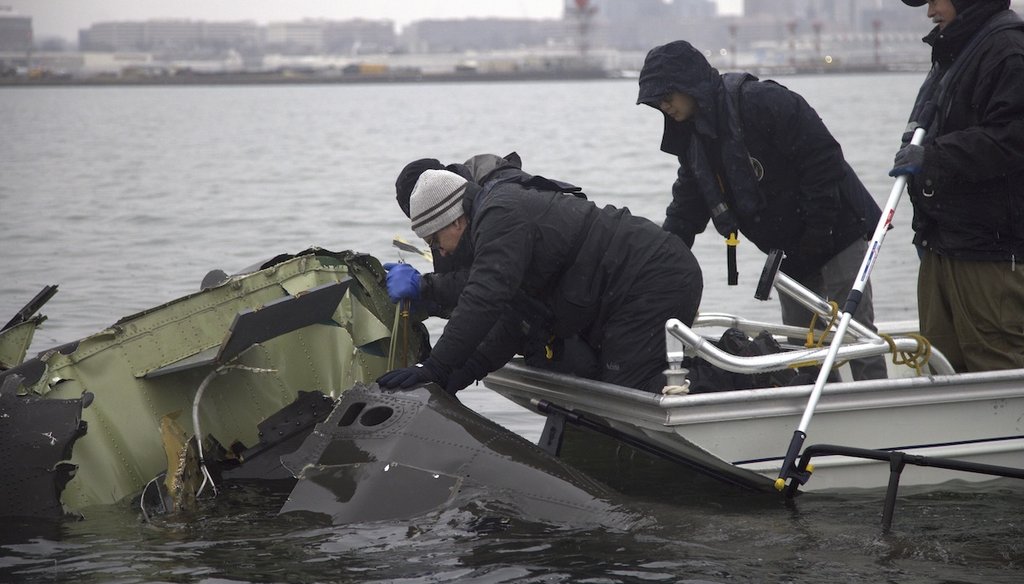

Our only agenda is to publish the truth so you can be an informed participant in democracy.
We need your help.


In this undated image provided by the National Transportation Safety Board, NTSB investigators and members of the salvage crew recover wreckage from the Army Black Hawk helicopter that collided with an American Airlines jet, Jan. 29, 2025.
Three crew members aboard the Black Hawk helicopter that collided with an American Airlines jet Jan. 29 in Washington, D.C., have been identified and two of their bodies were recovered Feb. 1.
Jonathan Koziol, chief of staff for the U.S. Army’s aviation directorate, said the Black Hawk helicopter involved in the incident had no AI capability.
Authorities have identified all three soldiers aboard the Black Hawk Helicopter that collided with an American Airlines jet over the Potomac River on Jan. 29. Yet some social media users said the aircraft was flying autonomously when the Washington, D.C., crash occurred.
"The Blackhawk in question, did not have a physical body in the aircraft and was being controlled remotely," a Jan. 31 Threads post said. "Planned or not planned, there were no pilots inside the chopper."
This post was flagged as part of Meta’s efforts to combat false news and misinformation on its News Feed. (Read more about our partnership with Meta, which owns Facebook, Instagram and Threads.)
This is wrong. The U.S. Army released the names of the helicopter’s three crew members: Capt. Rebecca Lobach, Staff. Sgt. Ryan O’Hara and Chief Warrant Officer 2 Andrew Eaves. A law enforcement source told CBS News Feb. 1 that two of the crew members' bodies had been recovered.
The military helicopter was on a training flight to practice evacuating government officials during an emergency, Jonathan Koziol, chief of staff for the Army’s aviation directorate, said.
The U.S. military is testing technology to autonomously fly Black Hawk helicopters. But the Black Hawk helicopter that collided with the American Airlines jet was not using that technology.
Koziol told Defense Scoop, a publication about the U.S. military’s technology, that the helicopter in the accident "did not have any AI capability." Koziol said such AI testing would be done away from populated areas.
We did not immediately receive a response after asking the Military District of Washington whether the Black Hawk helicopter in the collision or any other Black Hawk helicopters use autonomous technologies.
We rate the claim that the Black Hawk helicopter involved in the American Airlines crash "was being controlled remotely" False.
Threads post (archived), Jan. 31, 2025
The Associated Press, Army releases name of 3rd soldier who died in helicopter and airliner crash, Feb. 1, 2025
CBS News, One of 3 soldiers aboard Black Hawk chopper involved in midair collision identified as longtime aviation officer, Feb. 1, 2025
CNN, Pilots tried to pull passenger jet’s nose up within seconds of deadly DC helicopter collision, preliminary NTSB data shows, Feb. 2, 2025
Lockheed Martin Corp., Command an Autonomous Black Hawk Helicopter from 300 Miles Away, Oct. 17, 2024
Lockheed Martin Corp., Sikorsky and Rain Successfully Demonstrate Autonomous Flight With Wildfire Mission Autonomy To Rapidly Find And Suppress Test Fires, Nov. 11, 2024
Defense Scoop, Army helicopter involved in fatal crash over the Potomac was not using AI, sources say, Jan. 30, 2025
In a world of wild talk and fake news, help us stand up for the facts.
